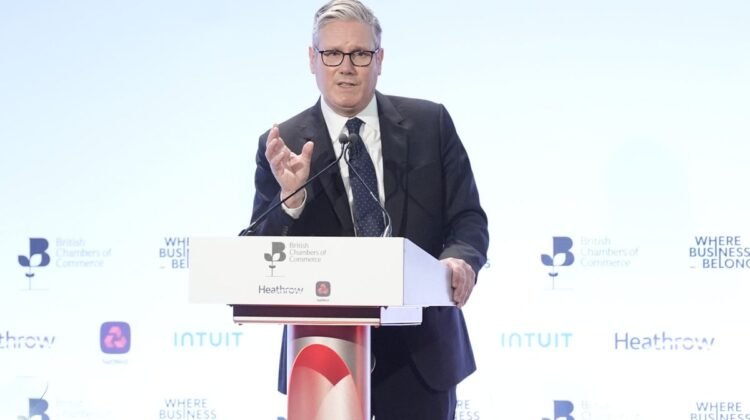
Starmer seeks to win round welfare rebels with promise of ‘fairness’

Prime Minister Sir Keir Starmer is in talks with Labour rebels over concessions to save the Government’s welfare reform package.
The talks ahead of Tuesday’s Commons showdown come after 126 Labour MPs publicly backed a move to block it.
Sir Keir told MPs he wanted the reforms, which will restrict access to sickness and incapacity benefits, to demonstrate “Labour values of fairness”.
The Prime Minister told MPs there was “consensus across the House on the urgent need for reform” of the “broken” welfare system.
“I know colleagues across the House are eager to start fixing that, and so am I, and that all colleagues want to get this right, and so do I,” he said.
“We want to see reform implemented with Labour values of fairness.
“That conversation will continue in the coming days, so we can begin making change together on Tuesday.”
The Universal Credit and Personal Independence Payment Bill has its second reading on Tuesday, the first opportunity for MPs to vote on it.
If the legislation clears its first hurdle, it will then face a few hours’ examination by all MPs the following week – rather than days or weeks in front of a committee tasked with looking at the Bill – with a plan for it to clear the Commons a little over a week later on July 9.
Ministers have said they will listen to suggestions to improve the legislation, but opposition appears entrenched and the swift timetable for the Bill could add to critics’ concerns.
Commons Leader Lucy Powell told MPs: “As the House would expect, the Government actively engages with parliamentary opinion throughout a bill’s passage, as we are doing intensively with the Universal Credit and Personal Independence Payment Bill.”
Overnight, six more Labour MPs added their names to the rebel amendment that would halt the legislation in its tracks.
The reasoned amendment argues that disabled people have not been properly consulted and further scrutiny of the changes is needed.
The new names take the total number of Labour backbenchers supporting the amendment, tabled by Treasury Select Committee chairwoman Dame Meg Hillier, to 126 out of a total of 162 backers from all parties.
The plans restrict eligibility for the personal independence payment (Pip), the main disability payment in England, and limit the sickness-related element of universal credit.
The Government hopes the changes will get more people back into work and save up to £5 billion a year.
One backbencher preparing to vote against the Bill told the PA news agency: “A lot of people have been saying they’re upset about this for months.
“To leave it until a few days before the vote, it’s not a very good way of running the country.
“It’s not very grown-up.”
They said that minor concessions would not be enough, warning: “I don’t think you can tinker with this. They need to go back to the drawing board.”
The Daily Telegraph reported that potential concessions being considered include a commitment to speed up payment of support to help people back into work and offering assurances that reviews of policies in this area will be published.
Meanwhile, The Times reported some MPs opposed to the plans had blamed Sir Keir’s chief of staff, Morgan McSweeney and suggested the time had come for “regime change” in Downing Street.
Asked if Sir Keir had confidence in his chief of staff, the No 10 spokesman would not comment on Downing Street staffing matters.
Analysis by the Institute for Fiscal Studies (IFS) think tank indicated that 800,000 fewer working-age people are expected to receive a Pip daily living award in 2029–30 as a result of the reforms.
The tighter criteria are set to lead to 430,000 new applicants – who would have received an award without reforms – receiving no award, and 370,000 existing claimants losing out following reassessment.
Most of the 800,000 losers will receive £3,850 per year less in Pip.
The 2.2 million existing claimants of the health element of universal credit who are expected to still be claiming in 2029–30 are estimated to see a £450 real decline in their support in that year because of the freezing of the payment.
There are also set to be 700,000 new claimants who will typically receive £2,700 a year less than they would have done under the current system, the IFS said.
It will be well into the 2030s before the reforms are fully rolled out and, in the long-term, the savings could amount to around £11 billion a year, the IFS said.
A little over a quarter of the public are supportive of the proposed reforms, according to polling published on Thursday.
Of 2,004 people surveyed by More in Common over the weekend, just 27% said they supported the planned changes to the benefits system and half (51%) said they believe the cuts would worsen the health of disabled people.
A similar proportion (52%) said the cuts would increase pressure on the NHS while six in 10 said the Government should look at alternative cost-saving measures instead.
Liberal Democrat leader Sir Ed Davey said the Government should pull the Bill and “go back to the drawing board” instead of “cutting vital support from thousands of vulnerable people”.








